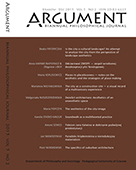Fideizm Jana Kalwina w doktrynie podwójnej predestynacji
John Calvin’s fideism in the doctrine of double predestination
Author(s): Antoni SzwedSubject(s): Philosophy, History of Philosophy, Social Philosophy, Theology and Religion
Published by: Wydawnictwo Uniwersytetu Komisji Edukacji Narodowej w Krakowie
Keywords: fideism; double predestination; depiction of God; determination of human morality; calvinistic Christianity
Summary/Abstract: Fideism, as a philosophical and theological view, is defined in various manners. Sometimes it is defined as the priority of faith over accounts of all kinds of cognition based on human reason. The Geneva reformer John Calvin (1509–1564) was a fideist, and he simultaneously admired Saint Augustine — traces of that admiration can be found very easy in the chief Calvin’s work Institutio christianae religionis. However, this does not mean that he shared Augustinian views on faith‑reason relations. John Calvin adopted late‑Augustinian interests, and was especially concerned with the issue of predestination. The Geneva reformer was the author of the double predestination doctrine. The chief claim of this doctrine is that: God intended one part of humanity for salvation; and the other one for damnation. This conclusion was supported with numerous quotations from the Old and the New Testament, and followed from the accepted exegetic principle that all words of the Holy Scripture are to be understood literally. Calvin also acted selectively and did not take into account other passages of the Bible contrary to them in sense. These different, even contradictory words and quotations create an incoherent image of God, which Calvin left unexplained as one of God’s mysteries. According to this image, God is a petulant despot, who by his irrational will treats people with unequal measure. God has settled a priori who would be saved and who would be damned, so the will of concrete man to act well or badly is without importance. In consequence, God is responsible for the evil and sins committed by people. Calvin’s God is unfair because he is merciful for one man, but not for other one. In approving a voluntaristic image of God, Calvin started becoming, particularly in the doctrine of double predestination, an extreme fideist, much more than his master Augustine. However, in later decades (especially in the seventeenth century), Calvin’s version of Christianity gaverise a rebellion against the double predestination doctrine, first in the ranks of the Dutch Calvinistic theologians (Armenians), and later in the circles of the English philosophers (Cambridge Platonics). In the end, Calvinism became a compromised Christianity and essentially contributed to the development of deism and atheism in Western European Countries in the eighteenth century.
Journal: ARGUMENT: Biannual Philosophical Journal
- Issue Year: V/2015
- Issue No: 2
- Page Range: 477-500
- Page Count: 24
- Language: Polish

